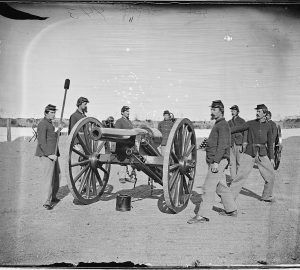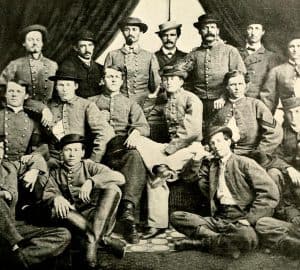
Soon after it’s formation, the new Confederate government took upon itself the task of choosing a seal and motto for itself. The seal deserves a post in its own right, but the motto is of special interest. The final motto agreed upon was Deo Vindice, meaning “With God, our Defender” or “Under God as our Vindicator.” However, this was not the first motto proposed. The motto under consideration in the House was Deo Duce Vincemus, meaning “under the leadership of God we will conquer.” But that was changed after a speech given by Thomas Semmes from Louisiana, reporting to the Senate on the actions of his committee. By now it was April 27, 1864, the government having been slow to move in this matter. Semmes said this:
The committee are dissatisfied with the motto on the seal proposed by the House resolution. … The word ‘duce‘ [lead, command] is too pagan in its signification, and is degrading to God, because it reduces him to the leader of an army; for scarcely does the word ‘duce‘ escape the lips before the imagination suggests ‘exercitus,’ an army for a leader to command. It degrades the Christian God to the level of pagan gods, goddesses and heroes, as is manifest from the following quotation; ‘Nil desperandum Tenero duce.’ [Never despair, if Teucer leads]1 This word duce is particularly objectionable because of its connection with the word ‘vincemus‘–(we will conquer). This connection makes God the leader of a physical army, by means of which we will conquer, not must conquer. If God be our leader we must conquer, or he would not be the God of Abraham, and of Isaac, and of Jacob, nor the God of the Christian. This very doubt implied in the word ‘vincemus‘ so qualifies the omnipotence of the God who is to be our ‘leader,’ that it imparts a degrading signification to the word ‘duce‘ in its relations to the attributes of the Deity.2

The Committee thought that by saying “under the leadership of God we will conquer,” they were insulting God by making him equal to the weak pagan gods, who were not always successful in their wars. They also did not like that the motto implied that they would always be at war:
The word ‘vincemus‘ is equally objectionable because it implies that war is to be our normal state; besides, it is in the future tense –‘ we will conquer.’ The future is always uncertain, and, therefore, it implies doubt. What becomes of our motto when we shall have conquered? The future becomes an accomplished fact, and our motto thus loses its significance. …
Having discarded the word ‘duce,’ the committee endeavored to select in lieu of it a word more in consonance with the attributes of the Deity, and therefore more imposing and significant. They think success has crowned their efforts in the selection of the word ‘vindex,’ which signifies an assenter, a defender, protector, deliverer, liberator, a mediator and a ruler or guardian. ‘Vindex’ also means an avenger or punisher.
No word appeared more grand, more expressive or significant than this. Under God as the asserter of our rights, the defender of our liberties, our protector against danger, our mediator, our ruler and guardian… What word can be suggested of more power, and so replete with sentiments and thoughts consonant with our idea of the omnipotence and justice of God?3
In this short speech we can see how the Confederate were being very careful to explicitly acknowledge God in a meaningful way. In this they were setting themselves apart from the original War for Independence, where “Nature’s God” is mentioned in the Declaration of Independence, but no reference to the deity appears in the Constitution other than “In the Year of Our Lord.” When the Confederates wrote their Constitution they added a reference to God in the preamble, and their chosen motto was equally Christian in intent.
1. From Horace’s Odes, Book I, Ode VII.
2. The Louisiana Book: Selections from the Literature of the State by Thomas M’Caleb (New Orleans: B. F. Straugham, 1894) p. 161.
3. Ibid, p. 162.




Very good information. I will be coming back here often.
It makes the old “Confederacy look great to be connected and give glory and praise to JESUS! GO DIXIE AND LET THE CONFEDERATE BATTLE FLAG WAVE FREELY!!!
Wonderful information. I am indebted for your efforts and exacting elucidation.
A potential issue here, though, is that the people doing the disputation may not have looked carefully enough at the ‘evolved’ meaning of “vinc-” as intended. The meaning then being closer to a perception of “prevailing by establishing our argument” (as in ‘evince’ in its current meaning) — which jibes with the Confederacy’s belief that their right to exist would be largely involved with recognition as a separate government, in part through agreement that ‘enough’ of the various separatist principles were seen to be valid.
Likewise the strictly-military interpretation of ‘ducere’ is, to my knowledge, neither in the original sense of the Latin nor in many English words incorporating it (proper construal of ‘education’ being one). Leadership or guidance does not require, or even imply, war as a method to achieve it.
The reported discussion reminds me, amusingly, of a Southern interpretation of ‘Deo Vindice’ itself, around a decade ago now, in which it was pointed out that some rather fundamental misunderstanding of Latin words beginning with “vin” was being commonly applied to the term as expressed. The argument … and some of the rhetoric … used there could be, I think, applied to the newly-self-identified Confederates here…
Apparently, the meaning of vindicate escapes you. Either way, God predestines whatsoever comes to pass. Does that always mean that the victors have the moral high ground? I think not. In fact, slavery was not even the main issue. The issue of the war was secession, not slavery.
ya’ll ought to join us.